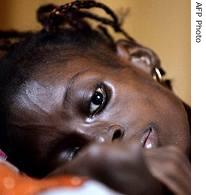2007年VOA标准英语-International AIDS Conference Wraps Up in Rwand
时间:2019-02-07 作者:英语课 分类:2007年VOA标准英语(六月)
Kigali
19 June 2007
An international AIDS conference wrapped up in Rwanda's capital Tuesday with speakers urging participants to continue the fight against HIV/AIDS, provide employment opportunities to people living with the virus, and reach out to communities to give relevant care and treatment. Cathy Majtenyi reports for VOA from Kigali.

A young HIV-infected woman lying in an Abidjan hospital (file)
Rwandan First Lady Jeanette Kagame closed the conference by challenging African governments and societies to break taboos 1 surrounding HIV/AIDS, stop practicing unsafe sex, and protect children from becoming infected.
She urged participants to continue to fight HIV/AIDS and not to discriminate 2 against people living with the disease.
"Too often, we are elaborating our efforts to protect the reputation of the wealthy and say they died or are suffering from ailments 3 other than AIDS," said Kagame. "But at the same time, we are quick to judge the poor as irresponsible when they become victims of this scourge 4. AIDS does not make social judgments 5, so why do we? AIDS does not affect families based on their economic wealth, so why should we?"
Kagame said that, in her country, the fight against HIV/AIDS is particularly intense because of what Rwanda went through in 1994, when ethnic 6 Hutu extremists waged genocide against minority Tutsis and moderate Hutus.
"You all know that barely 13 years ago we lost over a million lives in just 100 days," she said. "We simply cannot afford to lose any more lives to an affliction we can do something about."
Kagame was one of the speakers closing the four-day HIV/AIDS Implementers Meeting in which about 2,000 participants from around the globe looked at how governments, business, the health care sector 7 and others can collaborate 8 in the fight against HIV/ AIDS.
Artist and UNAIDS special representative Mary Fisher, who designs bracelets 9 and employs HIV positive women in Rwanda and Zambia to make the jewelry 10, also addressed the meeting.
Fisher, who is HIV positive, said poverty-stricken women living with HIV/AIDS need steady work with decent wages and fair compensation for what they produce so they can take charge of their lives and feed and clothe their families.
"My sisters are weary of charity. We want work," said Fisher. "We do not want medications that keep us breathing but enslaved. We want the dignity that comes with proving that we matter, the power that accompanies a just wage. Drugs give us the capacity to live, but employment gives us a reason."
In many presentations throughout the conference, experts stressed the need to make HIV/AIDS programs and services relevant to the people they serve and to involve local communities in the design and implementation 11 of those programs.
Father Edward Philips, a Catholic priest who works in Nairobi's informal settlements, said he and his colleagues came up with a way of getting people to stick to their cumbersome 12 anti-retroviral regimes.
"We're asking people to take the medication for the rest of their lives," said Philips. "So how do we motivate them on a consistent basis to take medicines for the rest of their lives? Kenyans love certificates. And so I said, hey, let's make certificates. If you take your medication well, at the end of the year you're going to get a certificate. It's also a stigma 13 breaker."
The conference was sponsored by the United States President's Emergency Plan for AIDS Relief, along with the Global Fund to Fight AIDS, Tuberculosis 14 and Malaria 15, the World Bank, and three United Nations agencies.
Sub-Saharan Africa is especially hard hit by the scourge. Although the continent contains 10 percent of the world's population, it is home to almost 70 percent of people around the globe living with HIV/AIDS.
The United States President's Emergency Plan for AIDS Relief is a five-year, $15 billion initiative to help countries treat and prevent the spread of HIV/AIDS.
- She was unhorsed by fences, laws and alien taboos. 她被藩蓠、法律及外来的戒律赶下了马。
- His mind was charged with taboos. 他头脑里忌讳很多。
- You must learn to discriminate between facts and opinions.你必须学会把事实和看法区分出来。
- They can discriminate hundreds of colours.他们能分辨上百种颜色。
- His ailments include a mild heart attack and arthritis. 他患有轻度心脏病和关节炎。
- He hospitalizes patients for minor ailments. 他把只有小病的患者也送进医院。
- Smallpox was once the scourge of the world.天花曾是世界的大患。
- The new boss was the scourge of the inefficient.新老板来了以后,不称职的人就遭殃了。
- A peculiar austerity marked his judgments of modern life. 他对现代生活的批评带着一种特殊的苛刻。
- He is swift with his judgments. 他判断迅速。
- This music would sound more ethnic if you played it in steel drums.如果你用钢鼓演奏,这首乐曲将更具民族特色。
- The plan is likely only to aggravate ethnic frictions.这一方案很有可能只会加剧种族冲突。
- The export sector will aid the economic recovery. 出口产业将促进经济复苏。
- The enemy have attacked the British sector.敌人已进攻英国防区。
- The work gets done more quickly when we collaborate.我们一旦合作,工作做起来就更快了。
- I would ask you to collaborate with us in this work.我们愿意请你们在这项工作中和我们合作。
- The lamplight struck a gleam from her bracelets. 她的手镯在灯光的照射下闪闪发亮。 来自《简明英汉词典》
- On display are earrings, necklaces and bracelets made from jade, amber and amethyst. 展出的有用玉石、琥珀和紫水晶做的耳环、项链和手镯。 来自《简明英汉词典》
- The burglars walked off with all my jewelry.夜盗偷走了我的全部珠宝。
- Jewelry and lace are mostly feminine belongings.珠宝和花边多数是女性用品。
- Although the machine looks cumbersome,it is actually easy to use.尽管这台机器看上去很笨重,操作起来却很容易。
- The furniture is too cumbersome to move.家具太笨,搬起来很不方便。
- Being an unmarried mother used to carry a social stigma.做未婚母亲在社会上曾是不光彩的事。
- The stigma of losing weighed heavily on the team.失败的耻辱让整个队伍压力沉重。
- People used to go to special health spring to recover from tuberculosis.人们常去温泉疗养胜地治疗肺结核。
- Tuberculosis is a curable disease.肺结核是一种可治愈的病。